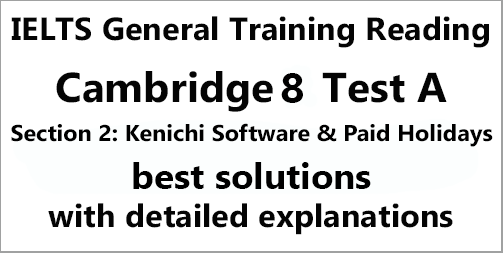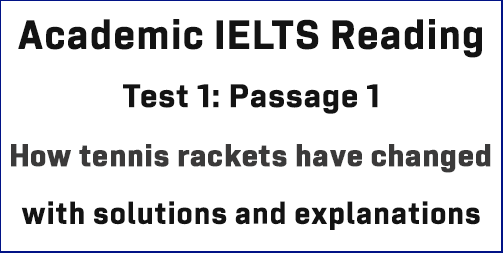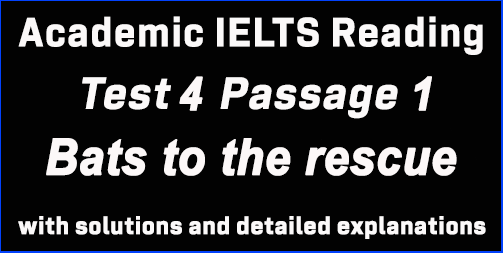IELTS General Training Reading: Cambridge 8 Test A Section 2; Kenichi Software & Paid Holidays; with best solutions and best explanations
This General Training IELTS Reading post deals with a solution package for IELTS Cambridge 8 Reading Test A Section 1 that has two texts entitled ‘Kenichi Software: security guidelines for staff’ and ‘Is Everyone Entitled To Paid Holidays?’. This is a targeted post for candidates who have significant problems in searching for and understanding Reading Answers. This post can guide you the best to understand every Reading answer easily and without much difficulty. Finding IELTS Reading answers is a step-by-step process, and I can confidently say that this post will help you in this respect.
IELTS Cambridge 8 Test A: GT Reading Module
Section 2:
Question 15-20:
The headline of the text: Kenichi Software: security guidelines for staff
Questions 15-20: (Completing sentences with NO MORE THAN TWO WORDS):
In this type of question, candidates are asked to write a maximum two words to complete sentences on the given topic. For this type of question, first, skim the passage to find the keywords in the paragraph concerned with the answer, and then scan to find the exact word.
[TIPS: Here scanning technique will come in handy. Target the keywords of the questions to find the answers. Remember to focus on Proper nouns, random Capital letters, numbers, special characters of text, etc.]
Question 15: If you see anything suspicious, you should report it to a ________ employee.
Keywords for this question: suspicious, report it to, employee,
Take a close look at the last lines of the first section in the passage entitled ‘General’, “It is in everyone’s interest to maintain a high level of security in the workplace. You should immediately challenge any person who appears to be on the premises without proper authorisation, or inform a senior member of staff about any odd or unusual activity.”
Here, inform = report, member of staff = employee,
So, the answer is: senior
Question 16: If the company wants to stop you and __________ you, you have to agree to it.
Keywords for this question: company wants, stop you, have to agree,
The answer is in the second section of the passage entitled ‘Company Property’, where lines 1-6 says, “You are advised that it is within the company’s legal rights to detain any person on the grounds that they may be involved in the unauthorised removal of company property. The company reserves the right to search staff members leaving or entering the premises”
Here, detain = stop, the company reserves the right = you have to agree (as you are an employee), detain = stop,
So, the answer is: (to) search
Question 17: If you take things belonging to the company without permission, you will face _________ .
Keywords for this question: take things, belonging to, company, without permission, will face,
As our main keyword is without permission, we should look at the second paragraph of section no. 2 entitled ‘Company Property’. Here, this is written in lines 4-7, “Any member found removing company property from the building without proper authority will be subject to disciplinary action.”
Here, without proper authority = without permission,
So, the answer is: disciplinary action
Question 18: Staff, ______________ and visitors must all wear a badge on company premises.
Keywords for this question: Staff, visitors, must, wear, badge, on company premises,
The answer remains in section no. 3 entitled ‘Identity Badges’, where the writer mentions in lines 5-7, “Badges are issued by Human Resources, and contractors and people visiting the company on a one-off basis are also obliged to wear them.”
Here, people visiting the company = visitors,
So, the answer is: contractors
Question 19: You must not pass on confidential information to__________ .
Keywords for this question: must not pass on, confidential information,
The answer to this question can be traced in section no. 4 entitled ‘Confidential Matters’. Here, the writer says in lines 8-11, “It is, therefore, essential that you should at all times be aware of the serious view the company would take of disclosure of such material to outsiders.”
Here, should at all times be aware of the serious view the company would take of disclosure of such material = must not pass on confidential information,
So, the answer is: outsiders
Question 20: If you leave the company, you have to hand in any ___________ you have made on matters concerning the company.
Keywords for this question: if, leave the company, have to hand in, you have made, on matters, concerning, company,
The answer to this question can be traced in section no. 4 entitled ‘Confidential Matters’. Here, the writer says in lines 17-21, “Before you leave the company, you must hand over to your manager all private notes relevant to the company’s business, activities, prices, accounts, costs etc.”
Here, must hand over = have to hand in,
So, the answer is: (private) notes
Question 21-27:
The headline of the text: Is Everyone Entitled To Paid Holidays?
Questions 21-27: [Short answer to open questions (NO MORE THAN THREE WORDS)
[In this kind of question candidates have to answer some questions, only with some conditions like NO MORE THAN THREE/TWO WORDS and/or A NUMBER or, ONE WORD ONLY. Each question has keywords that will lead to the answer. This question type generally follows a sequence.]
Question 21: In what year were the regulations extended to cover most of the workers who were originally excluded?
Keywords for this question: year, regulations, extended, cover, most, workers, originally, excluded,
In lines 3-6 of the first paragraph the writer says, “Since the regulations were amended, with effect from 1 August 2003, the majority of these workers have been entitled to paid holidays, and since 1 August 2004, the regulations have also applied to junior doctors..”
Here, amended, with effect from = regulations extended,
So, the answer is: (in) 2003
Question 22: What is the minimum annual paid holiday which workers are entitled to?
Keywords for this question: pay increases, depend, each member of staff makes,
Take a look at the second paragraph where the writer mentions holiday lengths, “Workers who qualify are entitled to no fewer than four weeks of paid holiday a year, and public holidays (normally eight days in England and Wales) count towards this. However, workers and employers can agree longer holidays.”
Here, no fewer than = minimum, a year = annual,
So, the answer is: 4 weeks (a year)
Question 23: During a worker’s first year of employment, what proportion of their annual holiday does a month’s work give?
Keywords for this question: Employees must work, minimum, to be eligible, pension,
As the word ‘proportion’ means a fraction, let’s take a look at paragraph no. 3. Here, in lines 2 and 3, the writer says, “For the first year of work, special accrual rules apply. For each month of employment, workers are entitled to one-twelfth of the annual holiday.”
So, the answer is: one-twelfth (of annual holidays)
Question 24: What can an employer give a worker to stop them taking holiday that they have requested?
Keywords for this question: Staff may take, holiday at, provided by, the company,
Let’s go to paragraph no. 4. Here, the author mentions in lines 3-5, “If your employer does not want you to take that holiday, they can give you counter-notice equal to the holiday -.”
So, the answer is: (equal) counter-notice
Question 25: What is given as a possible reason for an employee having to take a holiday at a certain time?
Keywords for this question: company, pay, half the seat price, plays,
The answer can be found in paragraph no. 5, as the writer states here, “If the employer wants you to take holiday at a given time, e.g. when there is a shutdown at the same time every year,’ they must give you notice of at least twice the length of the holiday.”
So, the answer is: (the) (annual) shutdown/ (a) shutdown
Question 26: When an employee leaves their job, what should be given in place of any holiday they have not taken?
Keywords for this answer: company, gives, financial assistance, both, educational, courses, part of staff development,
In the 6th paragraph, the author of this text says in lines 3-5, “However, when you leave the job, you are entitled to receive payment for any outstanding holiday, provided your contract specifically allows for this.”
Here, entitled to receive = should be given,
So, the answer is: (a) (holiday) payment/outstanding holiday payment
Question 27: Apart from a contract, what type of document may set out an employee’s holiday rights?
Keywords for this answer: Employees, entitled to, find themselves, difficult circumstances,
In the last paragraph, the writer says in lines 1-2, “It may be that your contract gives you better rights, or your holiday rights might be specified in a collective agreement.”
Here, apart from = or, may set out = might be specified,
So, the answer is: (a) collective agreement
Click here for solutions to Cambridge 8 General Training Reading Test A Section 1
Click here for solutions to Cambridge 8 General Training Reading Test A Section 3




One thought on “IELTS General Training Reading: Cambridge 8 Test A Section 2; Kenichi Software & Paid Holidays; with best solutions and best explanations”